Unit 1 Lesson 1 A Trip to China 课件+音频(共17张PPT) 冀教版英语七年级下册
文档属性
| 名称 | Unit 1 Lesson 1 A Trip to China 课件+音频(共17张PPT) 冀教版英语七年级下册 | 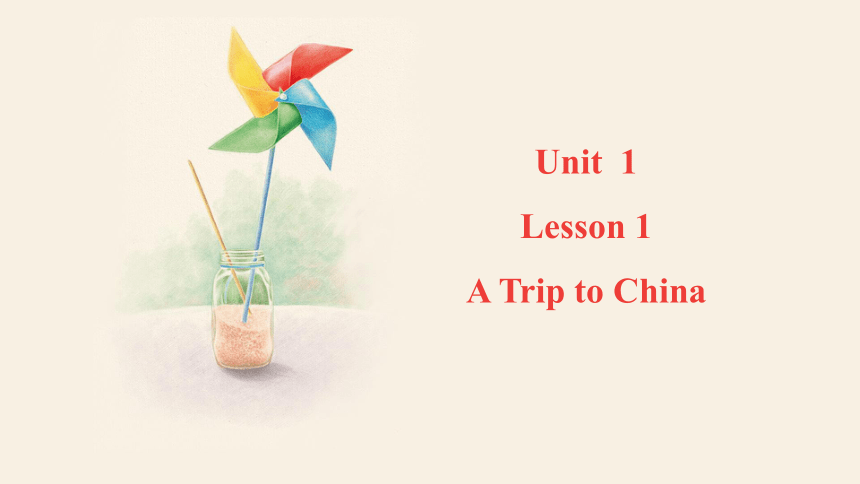 | |
| 格式 | pptx | ||
| 文件大小 | 2.9MB | ||
| 资源类型 | 教案 | ||
| 版本资源 | 冀教版 | ||
| 科目 | 英语 | ||
| 更新时间 | 2023-12-28 09:53:05 | ||
图片预览

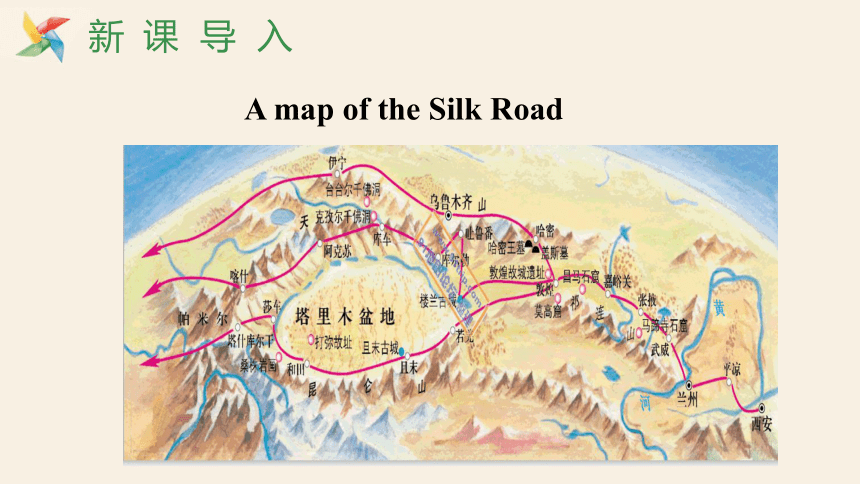
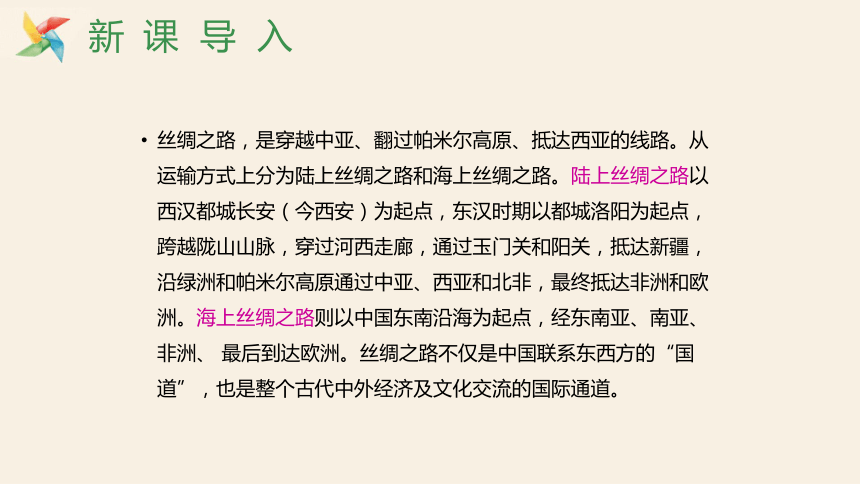
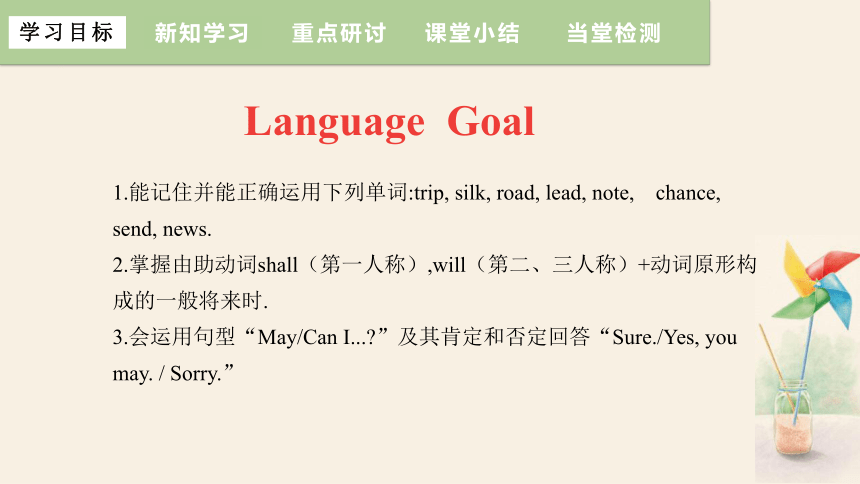

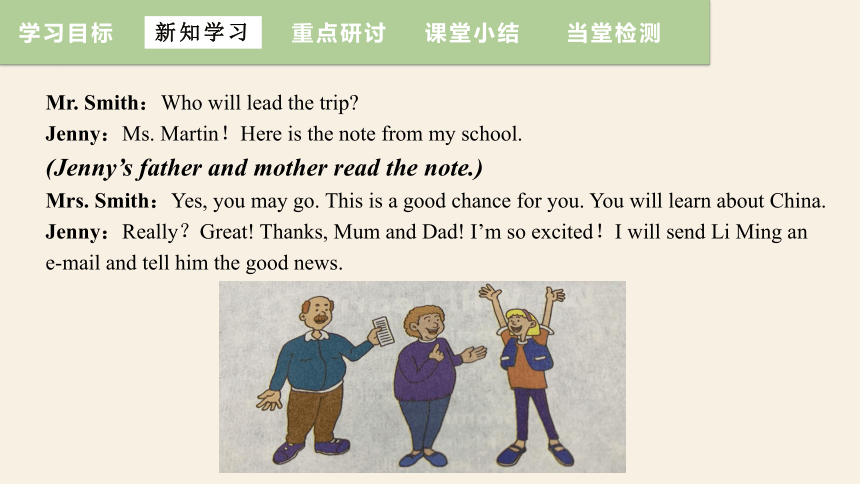
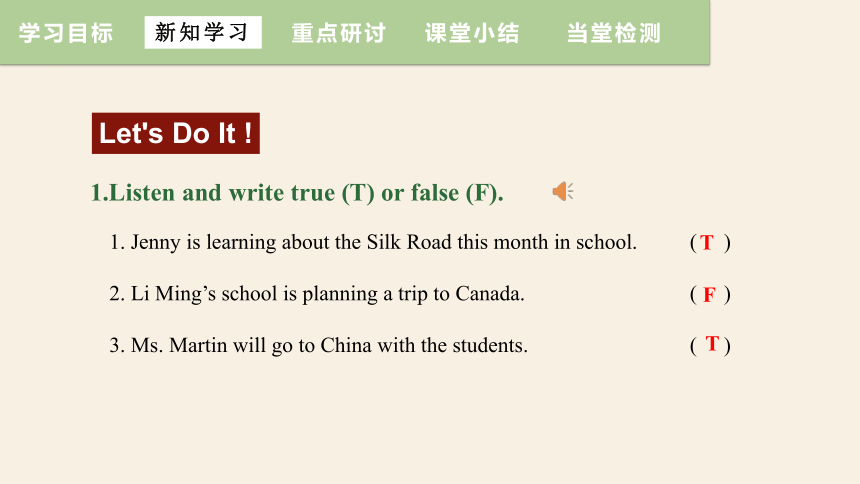
文档简介
(共17张PPT)
Unit 1
Lesson 1
A Trip to China
新
课
导
入
A map of the Silk Road
丝绸之路,是穿越中亚、翻过帕米尔高原、抵达西亚的线路。从运输方式上分为陆上丝绸之路和海上丝绸之路。陆上丝绸之路以西汉都城长安(今西安)为起点,东汉时期以都城洛阳为起点,跨越陇山山脉,穿过河西走廊,通过玉门关和阳关,抵达新疆,沿绿洲和帕米尔高原通过中亚、西亚和北非,最终抵达非洲和欧洲。海上丝绸之路则以中国东南沿海为起点,经东南亚、南亚、非洲、 最后到达欧洲。丝绸之路不仅是中国联系东西方的“国道”,也是整个古代中外经济及文化交流的国际通道。
新
课
导
入
Language Goal
新知学习
课堂小结
当堂检测
学习目标
重点研讨
1.能记住并能正确运用下列单词:trip, silk, road, lead, note, chance, send, news.
2.掌握由助动词shall(第一人称),will(第二、三人称)+动词原形构成的一般将来时.
3.会运用句型“May/Can I... ”及其肯定和否定回答“Sure./Yes, you may. / Sorry.”
新知学习
课堂小结
当堂检测
学习目标
重点研讨
Jenny:Hi, Mum! Hi, Dad! Guess what! We’re learning about the Silk Road this month in school.
Mr. Smith:The Silk Road That’s in China!
Jenny:Yes, it is! Mum and Dad, may I ask you a question
Mrs. Smith:Sure, Jenny! What is it
Jenny:My school is planning a trip around China with Li Ming’s school. Some students from my class will go to China and travel on the Silk Road. May I go with them
新知学习
课堂小结
当堂检测
学习目标
重点研讨
Mr. Smith:Who will lead the trip
Jenny:Ms. Martin!Here is the note from my school.
(Jenny’s father and mother read the note.)
Mrs. Smith:Yes, you may go. This is a good chance for you. You will learn about China.
Jenny:Really?Great! Thanks, Mum and Dad! I’m so excited!I will send Li Ming an e mail and tell him the good news.
1. Jenny is learning about the Silk Road this month in school. ( )
2. Li Ming’s school is planning a trip to Canada. ( )
3. Ms. Martin will go to China with the students. ( )
新知学习
课堂小结
当堂检测
学习目标
重点研讨
1.Listen and write true (T) or false (F).
F
T
T
Let's Do It !
新知学习
课堂小结
当堂检测
学习目标
重点研讨
2. Read the dialogue in the lesson and answer the questions.
1.What is Jenny’s school planning?
Her school is planning a trip around China with Li Ming’ school.
2.Who will lead the trip?
Ms. Martin.
3.What does Mrs.Smith think about the trip?
She thinks it is a good chance for Jenny to learn about China.
4. Why will Jenny send Li Ming an e mail?
Because she wants to tell him the good news.
新知学习
课堂小结
当堂检测
学习目标
重点研讨
3. Fill in the blanks with the words in the box.
1.I plan to go on a ________ to Beijing this summer.
2.I have some good ________ for you.
3.Many people ________ to Hainan for their winter holiday.
4.Follow me! I will ________ you there.
5.I want to go to Beijing. Then I will have a ________ to see the Great Wall.
6.Leave a ________ for your parents so they won’t worry about you.
trip
news
travel
lead
chance
note
lead trip chance news travel note
新知学习
课堂小结
当堂检测
学习目标
重点研讨
4. Work in groups. Read the note from Jenny’s school and take turns
asking for permission to go on the trip.
Dear parents,
We are planning a trip to China during the March break.
We will join our sister school in China on a trip to the Silk Road. All
students in Grade 7 are invited. Ms. Martin will travel with the students.
Her class is doing a China Study this term. The group will leave on March
5 and come back on March 15. For more information, please come to the
meeting on Wednesday at 7 p.m.
Yours truly,
Mr. Brian Franklin
重点研讨
课堂小结
当堂检测
学习目标
新知学习
1. May I go with them? 我可以和他们去吗?
Language Points
may 是情态动词,表示允许或征询对方的
许可,其否定形式可以是 may not ,也可以是 must not / mustn’t;但表示禁止时常用 must not/mustn’t。例如:
—May I go to the cinema?——我可以去看电影吗?
—Yes, you may. / Not, you mustn’t. ——是的,你可以去。/ 不,你不可以去。
注意:表示客气请求或征询意见时,也可用
Can I/Could I/Could you… 句型来表达。例如:
Can I help you?要我帮忙吗?
Could you help me, please 你能帮我一下吗?
重点研讨
课堂小结
当堂检测
学习目标
新知学习
2. I will send Li Ming an e-mail and tell him the good news.
我会给李明发个电子邮件,并且告诉他这个好消息。
1)send sb. sth.=send sth. to sb. 给某人寄某物。例如:
He often sends his father money. 他常给父亲寄钱。
2)news,不可数名词。可用some, much来修饰,一条消息可说成a piece of news。
重点研讨
课堂小结
当堂检测
学习目标
新知学习
一般将来时表示将来某一时刻将要发生的动作或将来某一段时间内经常发生的动作或存在的状态。一般将来时由助动词shall(第一人称),will(第二、三人称)+动词原形构成。
(1)will/shall + do
(2)am/is/are going to + do
Grammar : 一般将来时用法
重点研讨
课堂小结
当堂检测
学习目标
新知学习
(1) 用will或shall表示。“助动词will或shall+动词原形”这一形式,表示将来发生的事情,用于征求对方的意见或表示客气的邀请。在口语中will用于所有人称,书面语中第一人称常用shall。
e.g. Tomorrow will be Sunday.
明天就是星期天。
The rain will stop soon.
雨很快就要停了。
Shall we go there at five
我们五点钟去那儿,好吗?
Will you please open the door
请你把门打开,好吗?
课堂小结
重点研讨
当堂检测
学习目标
新知学习
Unit 1
Lesson 1
1)send sb. sth.=send sth. to sb. 给某人寄某物.
2)news,不可数名词。可用some, much来修饰,一条消息可说成a piece of news.
会运用句型“May/Can I... ”及其肯定和否定回答“Sure./Yes, you may. / Sorry.”
掌握时态:一般将来时
构成形式:助动词shall(第一人称),will(第二、三人称)+动词原形构成
当堂检测
重点研讨
课堂小结
学习目标
新知学习
我计划去海南旅游。
I plan _____ to go on a _____ _____ Hainan.
2. 我有些好消息要告诉你。
I have _______ good _______ to tell you.
3. 这个男的把她带到一座白楼前。
The man ________ her_____ a white building.
4. 我们下周要去山西旅游。
We ______ ______ a ______ _______ Shanxi next week.
to
some
news
leads
to
to
will
have
to
trip
trip
一、根据句意完成句子。
当堂检测
重点研讨
课堂小结
学习目标
新知学习
二、根据句意及汉语提示填空。
1.We will go on a (旅行) to Hangzhou this vacation.
2.We're all excited to hear this good (消息).
3.I will Jenny an e-mail and invite her to our party.
4.You should take (笔记) in class.
5.It's a good (机会) for me to learn about Western culture.
trip
send
news
notes
chance
Unit 1
Lesson 1
A Trip to China
新
课
导
入
A map of the Silk Road
丝绸之路,是穿越中亚、翻过帕米尔高原、抵达西亚的线路。从运输方式上分为陆上丝绸之路和海上丝绸之路。陆上丝绸之路以西汉都城长安(今西安)为起点,东汉时期以都城洛阳为起点,跨越陇山山脉,穿过河西走廊,通过玉门关和阳关,抵达新疆,沿绿洲和帕米尔高原通过中亚、西亚和北非,最终抵达非洲和欧洲。海上丝绸之路则以中国东南沿海为起点,经东南亚、南亚、非洲、 最后到达欧洲。丝绸之路不仅是中国联系东西方的“国道”,也是整个古代中外经济及文化交流的国际通道。
新
课
导
入
Language Goal
新知学习
课堂小结
当堂检测
学习目标
重点研讨
1.能记住并能正确运用下列单词:trip, silk, road, lead, note, chance, send, news.
2.掌握由助动词shall(第一人称),will(第二、三人称)+动词原形构成的一般将来时.
3.会运用句型“May/Can I... ”及其肯定和否定回答“Sure./Yes, you may. / Sorry.”
新知学习
课堂小结
当堂检测
学习目标
重点研讨
Jenny:Hi, Mum! Hi, Dad! Guess what! We’re learning about the Silk Road this month in school.
Mr. Smith:The Silk Road That’s in China!
Jenny:Yes, it is! Mum and Dad, may I ask you a question
Mrs. Smith:Sure, Jenny! What is it
Jenny:My school is planning a trip around China with Li Ming’s school. Some students from my class will go to China and travel on the Silk Road. May I go with them
新知学习
课堂小结
当堂检测
学习目标
重点研讨
Mr. Smith:Who will lead the trip
Jenny:Ms. Martin!Here is the note from my school.
(Jenny’s father and mother read the note.)
Mrs. Smith:Yes, you may go. This is a good chance for you. You will learn about China.
Jenny:Really?Great! Thanks, Mum and Dad! I’m so excited!I will send Li Ming an e mail and tell him the good news.
1. Jenny is learning about the Silk Road this month in school. ( )
2. Li Ming’s school is planning a trip to Canada. ( )
3. Ms. Martin will go to China with the students. ( )
新知学习
课堂小结
当堂检测
学习目标
重点研讨
1.Listen and write true (T) or false (F).
F
T
T
Let's Do It !
新知学习
课堂小结
当堂检测
学习目标
重点研讨
2. Read the dialogue in the lesson and answer the questions.
1.What is Jenny’s school planning?
Her school is planning a trip around China with Li Ming’ school.
2.Who will lead the trip?
Ms. Martin.
3.What does Mrs.Smith think about the trip?
She thinks it is a good chance for Jenny to learn about China.
4. Why will Jenny send Li Ming an e mail?
Because she wants to tell him the good news.
新知学习
课堂小结
当堂检测
学习目标
重点研讨
3. Fill in the blanks with the words in the box.
1.I plan to go on a ________ to Beijing this summer.
2.I have some good ________ for you.
3.Many people ________ to Hainan for their winter holiday.
4.Follow me! I will ________ you there.
5.I want to go to Beijing. Then I will have a ________ to see the Great Wall.
6.Leave a ________ for your parents so they won’t worry about you.
trip
news
travel
lead
chance
note
lead trip chance news travel note
新知学习
课堂小结
当堂检测
学习目标
重点研讨
4. Work in groups. Read the note from Jenny’s school and take turns
asking for permission to go on the trip.
Dear parents,
We are planning a trip to China during the March break.
We will join our sister school in China on a trip to the Silk Road. All
students in Grade 7 are invited. Ms. Martin will travel with the students.
Her class is doing a China Study this term. The group will leave on March
5 and come back on March 15. For more information, please come to the
meeting on Wednesday at 7 p.m.
Yours truly,
Mr. Brian Franklin
重点研讨
课堂小结
当堂检测
学习目标
新知学习
1. May I go with them? 我可以和他们去吗?
Language Points
may 是情态动词,表示允许或征询对方的
许可,其否定形式可以是 may not ,也可以是 must not / mustn’t;但表示禁止时常用 must not/mustn’t。例如:
—May I go to the cinema?——我可以去看电影吗?
—Yes, you may. / Not, you mustn’t. ——是的,你可以去。/ 不,你不可以去。
注意:表示客气请求或征询意见时,也可用
Can I/Could I/Could you… 句型来表达。例如:
Can I help you?要我帮忙吗?
Could you help me, please 你能帮我一下吗?
重点研讨
课堂小结
当堂检测
学习目标
新知学习
2. I will send Li Ming an e-mail and tell him the good news.
我会给李明发个电子邮件,并且告诉他这个好消息。
1)send sb. sth.=send sth. to sb. 给某人寄某物。例如:
He often sends his father money. 他常给父亲寄钱。
2)news,不可数名词。可用some, much来修饰,一条消息可说成a piece of news。
重点研讨
课堂小结
当堂检测
学习目标
新知学习
一般将来时表示将来某一时刻将要发生的动作或将来某一段时间内经常发生的动作或存在的状态。一般将来时由助动词shall(第一人称),will(第二、三人称)+动词原形构成。
(1)will/shall + do
(2)am/is/are going to + do
Grammar : 一般将来时用法
重点研讨
课堂小结
当堂检测
学习目标
新知学习
(1) 用will或shall表示。“助动词will或shall+动词原形”这一形式,表示将来发生的事情,用于征求对方的意见或表示客气的邀请。在口语中will用于所有人称,书面语中第一人称常用shall。
e.g. Tomorrow will be Sunday.
明天就是星期天。
The rain will stop soon.
雨很快就要停了。
Shall we go there at five
我们五点钟去那儿,好吗?
Will you please open the door
请你把门打开,好吗?
课堂小结
重点研讨
当堂检测
学习目标
新知学习
Unit 1
Lesson 1
1)send sb. sth.=send sth. to sb. 给某人寄某物.
2)news,不可数名词。可用some, much来修饰,一条消息可说成a piece of news.
会运用句型“May/Can I... ”及其肯定和否定回答“Sure./Yes, you may. / Sorry.”
掌握时态:一般将来时
构成形式:助动词shall(第一人称),will(第二、三人称)+动词原形构成
当堂检测
重点研讨
课堂小结
学习目标
新知学习
我计划去海南旅游。
I plan _____ to go on a _____ _____ Hainan.
2. 我有些好消息要告诉你。
I have _______ good _______ to tell you.
3. 这个男的把她带到一座白楼前。
The man ________ her_____ a white building.
4. 我们下周要去山西旅游。
We ______ ______ a ______ _______ Shanxi next week.
to
some
news
leads
to
to
will
have
to
trip
trip
一、根据句意完成句子。
当堂检测
重点研讨
课堂小结
学习目标
新知学习
二、根据句意及汉语提示填空。
1.We will go on a (旅行) to Hangzhou this vacation.
2.We're all excited to hear this good (消息).
3.I will Jenny an e-mail and invite her to our party.
4.You should take (笔记) in class.
5.It's a good (机会) for me to learn about Western culture.
trip
send
news
notes
chance
同课章节目录
- Unit 1 A Trip to the Silk Road
- Lesson 1 A Trip to China
- Lesson 2 Meet You in Beijing
- Lesson 3 A Visit to Xi'an
- Lesson 4 A Visit to Lanzhou
- Lesson 5 Another Stop along the Silk Road
- Lesson 6 Jenny's Diary
- Unit 2 It's Show Time!
- Lesson 7 What's Your Project about?
- Lesson 8 Marco Polo and the Silk Road
- Lesson 9 Danny's School Project
- Lesson 10 Music and Dance
- Lesson 11 Food in China
- Lesson 12 A Blog about the Silk Road
- Unit 3 School Life
- Lesson 13 How Is School Going?
- Lesson 14 Jenny's School Life
- Lesson 15 Making a Difference
- Lesson 16 We Are with You!
- Lesson 17 School Science Fai
- Lesson 18 Teaching in China
- Unit 4 After-School Activities
- Lesson 19 A Dinner Date
- Lesson 20 Join Our Club!
- Lesson 21 What Is Your Club Type?
- Lesson 22 Big Plans for the Weekend
- Lesson 23 A Weekend with Grandma
- Lesson 24 How was Your Weekend?
- Unit 5 I Love Learning English!
- Lesson 25 A Phone Friend
- Lesson 26 Online Phone Calls
- Lesson 27 Amazing English
- Lesson 28 How Do I Learn English?
- Lesson 29 A Door to the World
- Lesson 30 Writing an E-mail in English
- Unit 6 Seasons
- Lesson 31 What Strange Weather!
- Lesson 32 I Can't Wait for Winter!
- Lesson 33 Kim's Favourite Season
- Lesson 34 Steven's Report
- Lesson 35 Surfing in Sydney
- Lesson 36 Spring in China
- Unit 7 Sports and Good Health
- Lesson 37 You Are What You Eat!
- Lesson 38 Stay Healthy!
- Lesson 39 Danny's Report
- Lesson 40 Move Your Body
- Lesson 41 Were People Healthy Then?
- Lesson 42 Know Yourself
- Unit 8 Summer Holiday Is Coming!
- Lesson 43 Have a Good Summer!
- Lesson 44 Volunteering in Summe
- Lesson 45 Baseball Season
- Lesson 46 Get Ready for Summer Holiday!
- Lesson 47 Summer Plans
- Lesson 48 Li Ming's Summer Holiday
